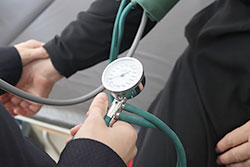Naima Buzi, 38 years old, paediatrician in Hatay

WHO
Naima Buzi considers herself lucky to be one of the more than 3.5 million Syrians who have had a chance to begin a new chapter of life after coming to Turkey. In Syria, she had been a paediatrician. “When the war began, we had to leave our country. We lost our families, our careers, our lives. We had to go back to square one,” she says.
At first, she believed that her medical diploma would not be valid in Turkey. But then a friend told her about the Refugee Health Training Programme. After passing the necessary tests, Naima began working at the Hatay Refugee Health Training Centre.
According to Naima, one of the most important benefits of the Programme is that it gives Syrian patients the chance to describe their health issues in their native language. “Using a common language simplifies the relationship between doctors and patients,” she says. “Sometimes refugees can’t understand the results of the tests or medical names for diseases, so they avoid Turkish doctors. But with us, they ask and we explain it to them. We also lighten the load on public hospitals.”
Communication is also a critical tool for dealing with patients who have had traumatic experiences, many of whom show symptoms of depression. “Our primary goal is to help patients,” says Naima. “I see children aged 2 and 3 who are struggling to cope with post-traumatic stress disorder. Of course, these children’s conditions make me sad, but I must be mentally strong. If I am not, I can’t help them.”
The Refugee Health Training Programme
In 2016, the Public Health Institution of Turkey, associated with the Ministry of Health, and the WHO Country Office in Turkey developed adaptation training for Syrian health workers living Turkey – including doctors, nurses and midwives.
WHO supports the classroom portion of the training, in collaboration with the Ministry of Health, and is committed to making sure that Syrian health professionals are equipped with the essential theoretical background for their future careers. In addition, WHO provides trainees with financial support for the duration of the practical training to cover living expenses and travel costs. The initiative is supported financially by European Civil Protection and Humanitarian Aid Operations (ECHO).
As of December 2017, more than 1000 Syrian doctors had participated in the theoretical courses; 639 had completed the practical courses; and 289 had received vocational competence certificates and were actively working in Refugee Health Training Centres. Of these doctors, 25% are female.



